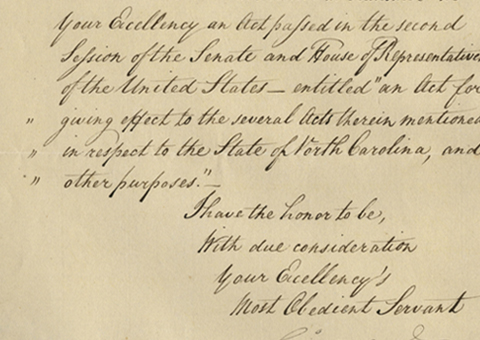Governor Patrick Henry Sends Notification That Virginia Has Adopted the Continental Congress’s Recommendations on Pensions For Disabled Veterans of the Revolution

He sends a very rare signed broadside to the County Clerks of Court, asking that they make sure claimants are entitled to their pensions
They should file “returns respecting the bodily abilities of all persons receiving annual pensions from the public, those who are proper objects to be continued on the list. In these returns it will be well to specify who are dead, and the intermarriage of widows.”
During the session that began in October...
They should file “returns respecting the bodily abilities of all persons receiving annual pensions from the public, those who are proper objects to be continued on the list. In these returns it will be well to specify who are dead, and the intermarriage of widows.”
During the session that began in October 1777, the Virginia General Assembly passed several laws designed to increase military enlistment. These laws authorized the payment of pensions to maimed and disabled soldiers and to the widows of men killed in action. In October 1782 an act was passed requiring county courts to certify on a semi-annual basis the continued eligibility of pensioners to receive allowances. The state auditor of public accounts maintained lists of pensioners that he sent to the county clerks for verification, and also issued warrants for the disbursement of pension funds.
On June 7, 1785, the Continental Congress passed a resolution recommending to the states that they adopt a uniform method of providing for invalid pensioners, that they “make provision for officers, soldiers or seamen, who have been disabled in the service of the United States” in a specified manner. Commissioned officers wholly disabled from earning a living were to be allowed a half pay pension for life. Non-commissioned officers or privates wholly disabled were to be paid full pensions of $5 per month for life. Proportionate allowance was to be made for partial disabilities. Each state was to administer these pensions, and keep records designed to make sure that only those persons disabled in the service of the state or United States, and were unable to work because of that disability, received pensions. The Virginia General Assembly responded by passing an act in October 1785 that adopted all of Congress’s recommendations.
Virginia Governor Patrick Henry promptly notified the clerks of the county courts of the act, as they were charged with responsibility for implementing its record keeping and reporting provisions, and best be able to ascertain whether a soldier was truly disabled and entitled to a pension.
Printed broadside signed, Virginia Council Chamber, Richmond, October 20, 1785, to the clerks of the county courts. “Gentlemen, The act of Assembly passed last session for further continuing the Act concerning Pensioners, directs the Courts of the several counties within this commonwealth to make, to the Executive, returns respecting the bodily abilities of all persons receiving annual pensions from the public, those who are proper objects to be continued on the list. Conceiving it possible that there are many on the list unknown to the several Courts, and seeing the obstacles in consequence thereof to a strict and efficacious inquiry into their respective conditions, I have caused an accurate list of them to be struck off, and do herewith forward one to you, that thereby you may see in what proportion they add to the burthen of taxes, and that by having their names your inquiries may be facilitated. I need not undertake to prove the good that will result from a strict examination into the conditions of the Pensioners, and making proper and punctual returns thereof to the Executive, nothing being more evident than the advantage of lessening the public debt.
“I could wish to have a return as soon as possible after the receipt hereof, and that afterwards you make returns punctually in months of April and May annually, as directed by the act of October, 1782, concerning Pensioners. In these returns it will be well to specify who are dead, and the intermarriage of widows. I am, Gentlemen, Your obedient humble servant, P. Henry”
He attached a list of over 200 pensioners, with the amounts they were receiving (attachment not included, but available online).
A very rare broadside to find signed, this being the first we have ever seen.

Frame, Display, Preserve
Each frame is custom constructed, using only proper museum archival materials. This includes:The finest frames, tailored to match the document you have chosen. These can period style, antiqued, gilded, wood, etc. Fabric mats, including silk and satin, as well as museum mat board with hand painted bevels. Attachment of the document to the matting to ensure its protection. This "hinging" is done according to archival standards. Protective "glass," or Tru Vue Optium Acrylic glazing, which is shatter resistant, 99% UV protective, and anti-reflective. You benefit from our decades of experience in designing and creating beautiful, compelling, and protective framed historical documents.
Learn more about our Framing Services








































































































